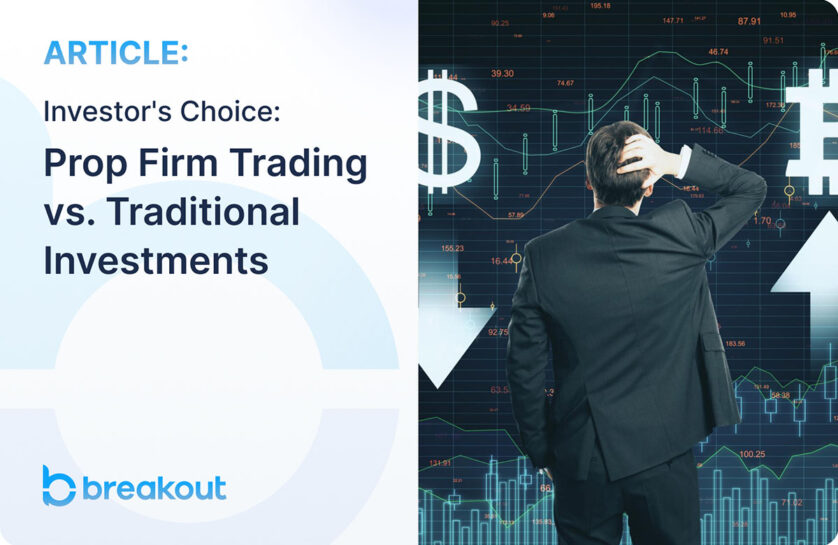


Prop trading firms give traders access to starting capital, sophisticated tech, and a generous profit-sharing split
Traditional investors by comparison incur platform fees, trading fees, and may have trading limits imposed upon them
Depending on the prop firm’s technical setup, traders can access leveraged trades, perpetual futures contracts, and other advanced trading products
Proprietary trading, often known as prop trading, has emerged as a groundbreaking force within the financial markets industry. In this innovative model, a prop firm provides substantial initial capital to proficient traders. These traders, in turn, employ their expertise and trading skills to generate significant profits, a portion of which is reinvested back into the firm, exemplifying a mutually beneficial success model.
This model is redefining revenue generation for financial institutions and prop firms, shifting away from conventional models heavily reliant on commission-based income or platform fees. It opens new avenues for prop traders and funded traders, who are endowed with a significant amount of firm’s capital to commence their trading journey. This crucial initial funding is pivotal in enabling traders to employ a variety of trading strategies, capitalizing on their knowledge of diverse financial instruments and their adeptness at navigating the complexities of market liquidity.

Proprietary trading stands out for its emphasis on a wide range of trading activities, from high frequency trading to global macro trading, providing traders with an expansive toolkit to approach the financial markets. This approach not only broadens the scope of trading opportunities but also introduces proprietary traders to a variety of market conditions, thus enhancing their trading experience and proficiency.
Moreover, the prop trading model significantly lowers the barrier of entry for new traders and those without substantial own capital. By trading with a prop firm’s capital, these traders can engage in financial markets without the personal financial risk that comes with trading their own money. This aspect of proprietary trading is particularly appealing to those looking to trade stocks, options, commodities, and other financial securities without the substantial initial investment typically required.
In addition, proprietary trading firms are often at the forefront of utilizing cutting-edge trading software and analytical tools, further empowering their traders. This technological advantage, combined with access to extensive resources and training programs, provides a robust foundation for traders to develop their trading styles and strategies effectively.
Proprietary trading also stands in contrast to traditional financial institutions like commercial banks or brokerage firms, which may engage in similar trading activities but often with more restrictive risk management protocols and less flexibility in terms of trading strategies. In prop trading, traders often have the freedom to explore speculative investments and engage in different forms of arbitrage, such as merger arbitrage or index arbitrage, under the guidance and support of the prop firm.

As the traders in prop firms work towards achieving consistent profitability and meeting their profit targets, they benefit from an environment that fosters skill development and technical analysis, enhancing their track record in the industry. The evaluation phase in these firms, designed to mimic real market conditions, plays a crucial role in preparing traders for the challenges of the financial markets, providing them with valuable information and insights that are not readily available in traditional trading environments.
Proprietary trading is significantly altering the landscape of financial trading. By providing traders with substantial capital, advanced trading tools, and a supportive environment, prop firms are enabling a new generation of traders to make their mark in the financial markets. This model not only benefits individual traders and the firms they represent but also contributes to the overall dynamism and evolution of trading strategies in the broader financial industry.

In prop trading, firms like Breakout are leading innovators, offering leverage as high as 5x on popular cryptocurrencies like Bitcoin and Ethereum, and up to 2x on other digital currencies. This level of leverage, often unavailable to retail traders on various centralized exchanges (CEXs) or traditional brokerages offering crypto products with inferior liquidity, underscores a key advantage of proprietary trading. Trading platforms in the broader financial markets typically restrict leverage to manage risk, but prop firms, understanding the balance between risk and reward, offer these enhanced leverage options.
Top-tier prop trading firms distinguish themselves by granting traders access to cutting-edge trading platforms, complete with sophisticated analytical tools and resources. This arsenal often includes proprietary trading algorithms and intricate quantitative models. Prop traders benefit from this technological edge, unlike traditional investors who may grapple with additional fees and trading constraints imposed by brokerage firms and financial institutions.


In proprietary trading, risk management is a pivotal aspect, with firms implementing comprehensive in-house rules. These rules, designed to foster safe trading practices, ensure the security and efficient use of the firm’s capital. They also provide a structured framework within which traders operate, a stark contrast to the often challenging risk management scenarios faced by individuals in traditional trading environments.
Skill development takes center stage in prop trading. Traders are put through rigorous testing in simulated markets that mirror real market conditions as part of the evaluation phase. This phase, unique to the proprietary trading paradigm, is instrumental in preparing traders for the realities of trading with substantial capital. Unlike independent traders or those associated with financial firms who might lack this focused training, prop traders receive support that is tailor-made to enhance their trading skills and strategies effectively.

One of the most compelling aspects of prop trading is the profit-sharing model. Prop firms typically allow traders to keep a significant majority, often between 80-90%, of the profits they generate. This arrangement stands in stark contrast to trading on one’s own account, where a trader retains all profits but may lack the necessary capital to make large trades. With proprietary trading, the benefit of working with a larger initial balance provided by the firm, sometimes as high as $500,000, becomes evident. This setup enables traders to realize potentially higher returns than they would with their own capital, making prop trading an attractive option for both new traders and experienced traders alike.

The proprietary trading model offers a multifaceted approach to the financial markets. It combines the benefits of substantial initial funding, access to advanced trading technologies, robust risk management frameworks, and an emphasis on skill development, all coupled with attractive profit-sharing arrangements. This innovative model is reshaping how traders, hedge funds, and other financial institutions engage with the markets, heralding a new era in the trading industry.
Prop traders in well-established prop firms enjoy access to an extensive range of trading strategies, encompassing not only arbitrage, swing trading, and momentum trading but also advanced techniques like volatility arbitrage, global macro trading, and index arbitrage. These strategies, when effectively executed, open up a myriad of opportunities in the financial markets. The technical setup of these firms further empowers traders to delve into complex financial instruments, including leveraged trades, perpetual futures contracts, options trading, and even speculative investments, offering a broader spectrum for potential profit generation.
Retail traders operating in traditional investment environments, while they might have some access to these strategies and instruments, often find their choices constrained by the limitations of the trading platforms and brokerage firms they are associated with. This limitation can impact their ability to diversify their trading styles and to adapt to varying market conditions.

While traditional investment channels present certain advantages, they often lack the comprehensive, all-encompassing nature of prop trading platforms. Traders who want to use a wide range of strategies may find it difficult to navigate through multiple platforms and exchanges, each with their own rules and limitations. This can make it challenging to develop a unified and flexible trading strategy. In this comparative analysis, traders exploring the distinctions between traditional investment avenues and proprietary trading platforms can gain insights into the nuanced differences in risk management, strategic support, and capital allocation between hedge fund vs prop trading models.

In contrast, proprietary trading offers a unified, well-funded portal into the world of financial trading. Trading with a prop firm’s capital, rather than their own, significantly reduces the financial risk to individual traders. Moreover, prop firms not only provide capital but also instill strong risk management practices. These firms often set forth guidelines that encourage trading styles and strategies effectively aligned with market dynamics, ensuring both the safety of the firm’s capital and the traders’ ongoing development.
Furthermore, prop trading firms often incorporate training and skill development as a core part of their model. Unlike the solitary journey of a retail trader, prop traders are typically guided through an evaluation phase involving simulated trading scenarios that reflect real market conditions. This immersive experience is invaluable, particularly for new traders and those looking to refine their trading skills, as it provides a safe environment to experiment with different strategies and learn from potential mistakes without risking their own capital.
Prop trading redefines engagement in financial markets, offering a distinctive model that blends substantial capital allocation with advanced strategy implementation. It diverges from traditional investment methods, particularly in leveraging diverse financial instruments and trading platforms. This approach not only widens market accessibility but also intensifies the focus on strategic trading, emphasizing risk management and technical analysis.
Key to proprietary trading is its tailored support to traders, from novices to experts. Prop firms invest in traders’ development, equipping them with resources and training essential for navigating the volatility and complexities of the market. This investment in human capital is crucial, especially in a field where nuanced understanding and adaptability are paramount.

Moreover, the risk management frameworks in proprietary trading are meticulously designed. These frameworks ensure traders operate within calculated limits, turning risk into a managed component of their trading strategies. This is a significant shift from the often unsystematic risk approach in traditional trading scenarios.
Prop trading is an exciting opportunity in the world of finance. It combines capital backing, creative approaches, and a commitment to ongoing education. This unique combination creates an environment where traders can succeed and make a real impact on the ever-changing world of financial markets.